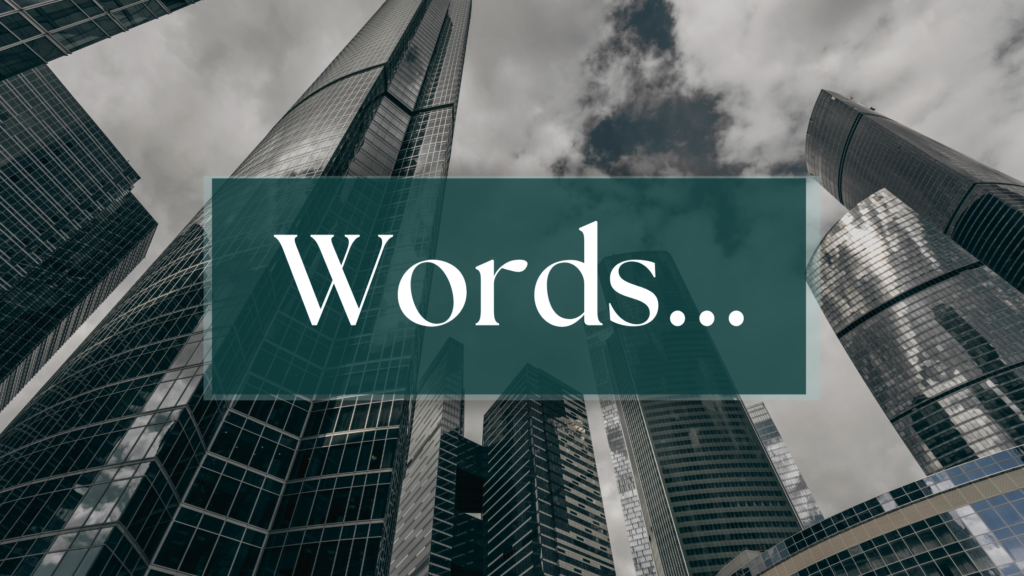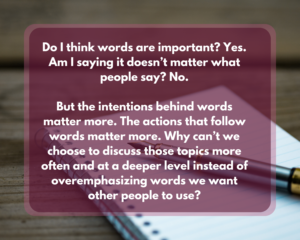
Today, I read a post on Linked in that read, “Dear Journalists, A disabled person does not “overcome” their disability to achieve something.” The person elaborated on the issues and harm this phrasing and perspective perpetuates in a full post.
In another post, I’ll possibly more directly discuss the points that were brought up, but I want to share my frustration with these types of posts that advocate what not to say.
We run into these word traps a lot in today’s society, don’t we? From “inspiration porn” to whether we should use person first or disability first wording or even if one should say “access technology” over “assistive technology”.
Over and over again, I hear that words matter. Phrasing matters. Perception matters. As a content creator, perhaps ‘influencer’ as some would have it, I can understand how it can be important. There are many times I quibble over one little word choice over another.
I have a disability or I’m disabled and even I sometimes can’t tell what or how I should say things.
I’m blind… visually impaired… low vision… However you would like to refer to it, I simply just can’t see well.
In fact, I started writing a post the other day, arguing against another post objecting to the use of “visually impaired’, but alas, it’s joined the rest of the accidentally unsaved and forever unreachable files I’ve managed to collect over the years. We’ll see if I can muster up the energy to rewrite it soon-ish, but no promises.
Words matter. The meaning behind words matters. And yet, connotations change, implications change and it’s ever a moving goalpost.
It’s frustrating to see that the more we discuss and protest word choices around disability, the more nervous, confused, and careful society becomes. I’ve had professionals approach me to ask how they should advise their colleagues and partners to refer or speak about or to people with disabilities because they don’t want to say the wrong thing. They are afraid to offend.
I’m all for tact, discretion and politeness. Yet, I wonder if the more discourse we elevate about what people should not say and what words or phrases not to even think… Is it actually helping? Or is it making it worse? Or maybe it’s just ineffectual?
What’s that old adage? Actions speak louder than words. What happened to that?

Often in the disability/disabled community, we complain about companies using words to placate our frustrations and accessibility challenges. This is very prevalent during GAAD (Global Accessibility Awareness Day). Companies tout how important accessibility is for them and promote discussions about the topic, but how often do actions result from these words?
After the show, what happens when there’s not enough contrast in a product or when I can’t open the settings menu on a program with a screen reader? Or if someone faces any accessibility issue?
Most often, the answer is… silence.
If ‘lucky’, I might get a “Thank you for submitting this feature request.”
I didn’t know “accessibility” was considered a “feature request”. And yes, this is often the response from those same companies that “celebrate” GAAD.
What happened to all the words?
Not much. Not much at all.
Do I think words are important? Yes. Am I saying it doesn’t matter what people say? No.
But the intentions behind words matter more. The actions that follow words matter more. Why can’t we choose to discuss those topics more often and at a deeper level instead of overemphasizing words we want other people to use?
What does it matter if they said person with a disability or chose to say disabled person? Was it relevant that they said, “visually impaired” instead of “low vision”? Which, in case you didn’t know, “low vision” is now the correct word to use… even if it’s not always the right descriptor. Did it matter that they did not say a deaf or blind person overcame their disability? Does it matter that they moved on from using “vision loss” to “became blind” or now uses the term “fully blind” instead of “totally blind?